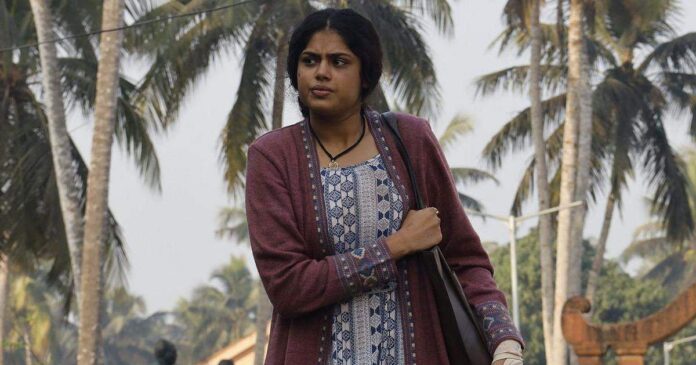In a scene in The Jengaburu Curse, a character says, rather wryly “jab mitti Sona ban jata hai toh paise hawa main udne lagte hai.” (when soil turns to gold, money begins to fly up in the air), highlighting how mining, with all the potential to unearth wealth, while uprooting and even annihilating communities is both the stuff of modern history and compelling urban legend. Think of how greed pushes a few to enslave many in KGF. Or how the desire for usurping wealth and proprietorship formed the basis of a race war in the upcoming Martin Scorsese film Killers Of The Flower Moon (based on a true crime book of the same name written by David Grann). But unlike say films, which arguably focus more on plots and events — The Jengaburu Curse, though choc-a-bloc with numerous events and steady plot swerving — keeps focusing on the various players of this tense, high-stakes, race-against-time kind of thriller. The series, though centred around Priyamvada Das (Faria Abdullah in decent form), takes one through the whole gamut of characters from various walks of life in Odisha, presenting the story through the perspective of precisely what they stand to lose and what they hope to gain in this game.
Director – Nila Madhab Panda
Cast – Faria Abdullah, Sudev Nair, Nasser, Makarand Deshpande, Sukumar Tudu
Streamer – Sony Liv
As most tales are wont to start, we first see Priyamvada alias Priya, a financial analyst from London, an achiever of course, take a flight to Bhubaneswar after she gets a call about her father missing. There is also a burnt body she is expected to recognise, as a blood relative of the unsubtly named Swatantra Das, an activist and a JNU professor (this is only the beginning of the many non-subtleties the show continually partakes in). If the contrast between the first world-inhabiting, number-crunching Priya vis-a-vis her tribal rights’ supporting father who has even gone to jail for three years (he was accused of being a naxal) wasn’t enough, we also learn that Priya grows up in Delhi and does not speak any Odia. Unlike most OTT series of late, where non-linear formats that keep cutting back to an important character’s childhood are quite common, we see very little of Priya’s past. Much like a lot of us, we see Priya encounter her past, sometimes as quick afterthoughts, other times as sharp pangs of pain one brushes aside to feel, or at least appear, better. In the Odisha of The Jengaburu Curse, we see a doctor sympathise for the naxals, a naxal sympathise for a group of displaced, disenfranchised tribals, a corrupt police officer, a kind police officer, a corrupt politician (who later has a change of heart) and a somewhat stereotypical caucasian whistleblower ( she is living undercover as a student in an Odissi academy). In this mix of individuals with motivations plotted across the moral spectrum, there is also Kannan (Sudev Nair), an interesting outsider-insider. An IAS officer with the kind of disturbed past we mostly see police officers possess in TV series and films, he was Swatantra’s student and Priya’s ex. One of the more interesting characters of the series, his journey is shaped by guilt and regret as much as it is by doing right by a community. There is also Ravichandran Rao, played by the formidable Nassar. His wily portrayal of a man whose intentions are one and actions are another is as delightful as it gets, reminding one of what an excellent actor can do with even the most typical of roles. I personally look forward to his roles in Bollywood films, only to hear him speak in that mellifluous Tamil-accented Hindi.
One of the things that The Jengaburu Curse gets so well, or rather, what makes it so interesting to watch, is its location. Odisha is this series’ most important character. Though set mostly in Bhubaneswar, we also see the story unfold in smaller towns like Cuttack and Raghurajpur. My respect and fascination for Odisha have certainly been piqued by The Jengaburu Curse, as we see the paradoxes this land is nestled in, where remnants of history, art and a glorious bygone civilization chaotically co-exist with congested, pollution-ridden streets. The spirit of small-town India, especially small-town Eastern India, comes through beautifully here. Shooting in real locations is a logistical nightmare for filmmakers, but stories like these are a reminder of why they must be shot with due respect to authenticity and realism.
The series is competent in its execution and makes for a satisfying watch but it never gets too compelling or explosive. For one, the makers never play around with their moralities. One look at every character is enough for you to know whether they are good or bad. And for something marketed as a cli-fi (climate fiction), we don’t see anything markedly pertaining to climate change. The pay-off, the whydunit that comes through in the end, is at best just political. Maybe this was meant to be a limited series, which is why you see the characters sit and talk atop a cliff in the end, as opposed to having an actual cliffhanger. In the tug-of-war between themes and thrilling elements, it is safe to say the latter has proclaimed its victory and how. But all said and done, The Jengaburu Curse makes for a decent watch. This is at best, the streaming equivalent of an airport read, and who would resist it, if the content is good?
#straightforward #effective #thriller #politics #planet #Cinema #express

